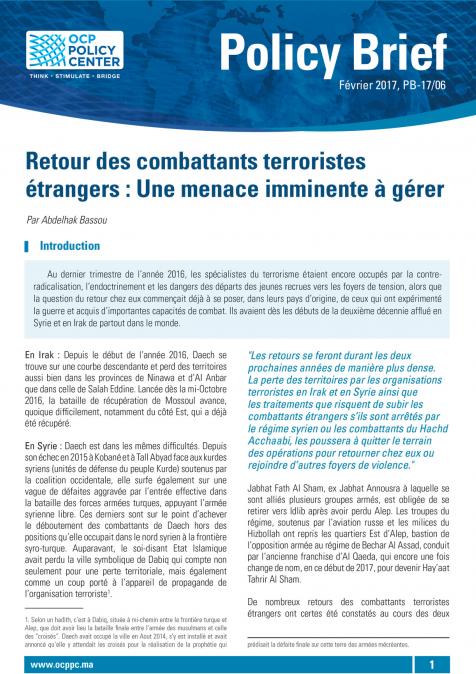John Sawers, former Chief of the Secret Intelligence Service (MI6), shares his insights on how security threats have evolved with the rise of digital technologies and social media. In this interview, he offers a compelling exploration of the shift from traditional methods to contemporary security challenges. Sawers examines how intelligence approaches have adapted to address new threats, including the influence of social media on democratic processes and the evolving global geopolitical landscape. The discussion provides An insightful analysis of the current dynamics in intelligence work and highlights the critical issues facing intelligence services in an increasingly interconnected and digital world.
RELATED CONTENT
-
AuthorsJune 14, 2017Le débat sur la défense est plus que jamais d’actualité dans un contexte mondial évolutif animé par la reconfiguration continue des équilibres géostratégiques et par le poids des conséquences de la crise économique et financière sur le budget des Etats : les politiques de défense seront-elles adaptées à leurs taches de demain ? Les stratèges des Etatsmajors auront-ils les moyens suffisants pour négocier efficacement le processus d’adaptation ? Outre la modernisation des systèmes d’a ...
-
AuthorsJune 14, 2017The debate on defense is more relevant than ever in an evolving global context that is driven by the constant reconfiguration of geostrategic equilibriums and by the importance of the impacts of the economic and financial crisis on States’ budgets leading to pertinent questions such as: will defense policies be adapted to their future tasks? Will the military leaders’ strategists have sufficient means to effectively negotiate the adaptation process? In addition to the modernization ...
-
Emiliano AlessandriMay 05, 2017This podcast is performere by Mr. Eamiliano Alessandri. While possible, prospects for repairing existing fractures through multilateral dialogue and compromise have become elusive as cris ...
-
AuthorsPatrick BrunotPascal ChaigneauJérôme EvrardSonia Le GouriellecAndreï GratchevMichael LebedevFlorent ParmentierAnne-Sophie RaujolGeorge VoloshinApril 13, 2017Cette publication conjointe entre HEC Center for Geopolitics et OCP Policy Center, compile douze Policy Papers qui ont été présentés, discutés et enrichis lors de la deuxième édition des Dialogues Stratégiques, une plateforme d’analyse et de débat stratégique autour des principaux enjeux géopolitiques et sécuritaires internationaux, mais également régionaux revêtant une importance capitale pour les continents européen et africain. Ce deuxième volume des Dialogues Stratégiques est co ...
-
AuthorsEmilliano AlessandriApril 7, 2017While possible, prospects for repairing existing fractures through multilateral dialogue and compromise have become elusive as crises in the region persist. There are quite a few unfavorable conditions hindering the emergence of some form of multilateral security process: areas of hot conflict have widened in recent years making violence almost endemic in the region, in countries like Syria, Iraq, Yemen and Libya. The Middle East peace process is in a stalemate and already thin trus ...
-
AuthorsMarch 6, 2017The big question for Africans on safeguarding peace and security is whether the Pan-African organization, which aspires to lead the continent towards peace and prosperity and to which the continent’s predisposed human and material resource potential, is able to ensure the fulfillment of these ambitions through its own institutions? In other words, can the African Union manage African crises with independent African means? This fundamental question calls for other more intermediate ...
-
AuthorsFebruary 15, 2017During the last quarter of 2016, terrorism specialists were still busy with the issues of counter-radicalization, indoctrination, and the dangers of young recruits departing to tension hotbeds, when the question arose about the return to their countries of origin by those who have experienced war and acquired significant combat capabilities. For nearly the past decade, they have been flocking to Syria and Iraq from around the world. ...
-
AuthorsFebruary 15, 2017Au dernier trimestre de l’année 2016, les spécialistes du terrorisme étaient encore occupés par la contreradicalisation, l’endoctrinement et les dangers des départs des jeunes recrues vers les foyers de tension, alors que la question du retour chez eux commençait déjà à se poser, dans leurs pays d’origine, de ceux qui ont expérimenté la guerre et acquis d’importantes capacités de combat. Ils avaient dès les débuts de la deuxième décennie afflué en Syrie et en Irak de partout dans le ...
-
AuthorsMostapha MouzouniJanuary 23, 2017Alors que la menaces, que la criminalité transnationale organisée présentait dans les années 70 était considérée comme étant secondaire, le changement de sa nature, l’augmentation de ses risques et sa stigmatisation de plus en plus soutenue comme étant responsable des instabilités politiques et de certains conflits internes, a poussé la communauté internationale à s’inscrire dans une logique de confrontation avec ses aspects les plus menaçants à la sécurité internationale. Or curieu ...
-
AuthorsJanuary 12, 2017La défaite des organisations terroristes au Moyen-Orient est attendue même s’elle prendra encore quelques temps, tellement Daech et Jabhat Fath Al Sham montrent de la résistance. La première du fait de ses équipements et de ses tactiques de guérillas, la seconde du fait que depuis qu’elle n’est plus une filiale d’Al-Qaeda a pu rallier d’autres groupes syriens. Les deux organisations résistent également parce qu’elles sont renforcées par des milliers de Combattants Terroristes Etrang ...











